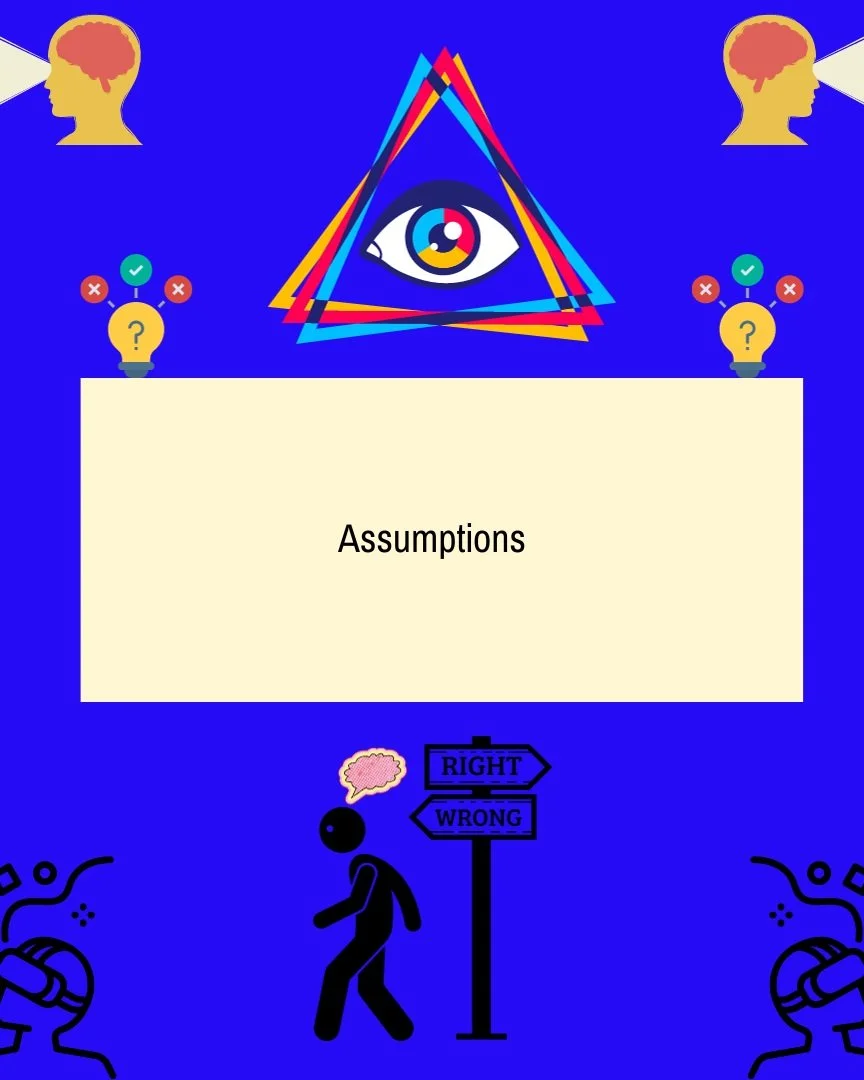Assumptions
Assumptions
Assumptions, something accepted as truth without proof. Unexamined beliefs we think without realizing we think it. Assumptions guiding a large portion of our perception towards people, events or aspects of life, very well based off our own internal psychology or ones state of mind.
Hunting Assumptions
Hunting assumptions means to undertake a process of critical reflection, to not jump at conclusions before assessing for factual information which makes our thought or perception honest and relevant. Hunting assumptions is pausing and reflecting on what we believe and how we came to obtain that belief. Deep rooted assumptions can become unearthed and a whole new light cast upon topics used to be perceived as simple cause and effect. Questions manifest and when answered can completely alternate perspectives once had and form them to fundamental beliefs based on truth, not assumption.
Paradigmatic Assumptions
Paradigmatic assumptions inform our view of reality, our worldview assumptions which determine how we order and see the world. These are the foundational assumptions of our lives, the beliefs which guide how we perceive the world or determine who we are as people. Why do you think people have so many differing opinions on different aspects of life, they can’t all be correct can they? Or are they based on assumptions determined by that individuals outlook on life? If you grow up in a family enveloped by domestic violence, you may grow to assume that abusive behaviour is an acceptable measure towards enforcing submissiveness in a spousal relationship, in turn displaying the same actions in future. See how our environments inform our view of reality, beliefs can form from a single perspective. This is why we need to pause for a moment, take a step back and overlook the whole dynamic to our situation, being open and analytical towards differing perspectives.
Prescriptive Assumptions
Prescriptive assumptions are what we think ought to happen, or what we expect. It’s an assuming basic law which guides us, such as the placement of a knife and fork on a table, manners, or how people should act. It is very much assumptions based off the word, “should.” Teachers should do this, the government should do that, someone should respect me. Though at the end of the day it is still an assumption based on your outlook of reality. Why should someone respect you? Is there an inherent law which guarantees their respect? What happens if they choose not to? If something bypasses these assuming principles it may cause conflicting thoughts, though this is where we must remember they are assumptions after all, someone does not have to use the manner you expect, someone does not have to place a knife and fork a certain way because you expect it, respect won’t always come your way. Just cause things “should” be a certain way in one perspective doesn’t mean it is going to be that way in every perspective.
Causal Assumptions
Causal assumptions inform what we expect to happen, a this causes that principle or cause and effect. Assumption that if I am nice to this person, they will be nice in return. It is an assumption, technically they do not have to be nice, but we assume it. Causal assumptions tell us that an attitude today was caused by a certain event in our childhood. It could very well be true, and correlations may match perfectly, though it is still an assumption as no defining evidence underpins it. Consistency equals success is another one, these assumptions being cultivated by concepts we’ve heard, things we’ve experienced, or lifestyles we’ve witnessed. If a psychologist states that creating a safe space for people will make them more able to openly communicate, it is still an assumption, one based off evidence as it may very well be true for many people, but not for everyone.



